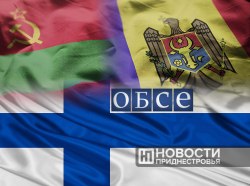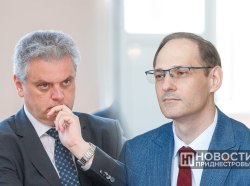It is on record as the Pridnestrovie's Foreign Ministry reported on January 28 that, at the Kishinev airport, the officers of the Moldovan migration police reqiure Moldavan documents (residence permit or passport of RM) from Pridnestrovie's citizens even more often and also threaten with deportation to those who hadn't any of the papers.
Novosti Pridnestrovya contacted the Pridnestrovie's citizens who had experienced all "communication amenities" from the RM representatives. We will tell some stories about what one can face at the Kishinev airport when crossing customs control today:
Pyotr V. tells about psychological coercion exerted by the Moldavan customs officers:
"When inspected my documents, they told me to show the document certifying of my residence in Moldova – the passport or residence permit. I hadn't such documents, but a Pridnestrovian passport only, however the customs officer refused inspecting it. I was told to wait at the registration rack. I asked again in 10 minutes, how much I had to wait because I could be late for my flight. I was answered that some special people would come to take up my issue and that I had to pay a penalty, and that I would be deported for 5 years. Only 5 minutes before the end of landing, another Moldavan customs officer accepted my documents and told that it was the last time I was allowed to pass".
Catherine T. was going to visit relatives in Moscow – the Moldavan customs officers reduced her to tears:
"At the airport of Kishinev, when passing customs control, besides an international Russian passport, I was required a Moldavan document, an ID or a residence permit. When I told that I had no such documents and I lived in Tiraspol, I was refused to pass to my flight and I was told that I had violated rules of stay in Moldova. When I asked about the grounds of such forbiddance, I was answered pass a penalty at first, or I would be deported from Moldova to "my Russia". Only in 20 minutes of suasion and tears my passport was stamped, and then I was warned that I wouldn't pass next time definitely".
Tamara S. has faced rudeness of the customs officers:
"I was required to show the Moldavan documents again, threatened to be deported from the country. If you tell that you are from Pridnestrovie, they behave rudely. Earlier, I read, there were agreements with Moldova that Pridnestrovian citizens could have no problems crossing the Moldavan border. However, when you tell it to the Moldavan customs officers, they laugh and answer in a rough form that Pridnestrovie doesn't exist, and 'all these pieces of paper' mean nothing according to Moldovan laws. I have already come up against such situation twice".
In all these cases, Pridnestrovie's residents are detained intentionally; obviously, it is done in order that people missed their plane. As it follows from the stories telling that, actually, the Moldavan authorities openly use methods of psychological coercion to put this or that idea to the head of a person. In these particular cases – necessity for making the Moldavan documents (residence permit, the ID).
Novosti Pridnestrovya received a record of telephone conversation between the resident of Tiraspol and the Moldovan migration police officer.
The Pridnestrovie's citizen with the Russian international passport faced a threat of deportation at the Kishinev airport. Trying to find out whether he will be able to cross border without problem, Nikolay called to the border police of the RM. In reply, the officer explains evasively that deportation is possible in case of violations of the rules of stay in the territory of the RM. However, he notes that nobody has the right to force someone to receive residence permit. Nevertheless, the migration police officer refused to explain the rules of stay in the territory of Moldova for Pridnestrovians with international passports of Russia or Ukraine.
The fact remains, there are no restrictions in period of stay in Moldova for the Pridnestrovie's residents. Accordingly, there cannot be any reasons for penalties, deportations, special conversations and others instruments of psychological infusion. To make certain of it, we will address to the Violations Code of the Republic of Moldova.
We open article 333 and attentively read clause 4. It is written absolutely clumsily of course and in the best traditions of the gobbledygook of official documents, but we will be patient and we will read it up to the end: "Non declaration of entrance to the territory of the Republic of Moldova by foreign citizens or stateless persons, except for the persons whose entrance is allowed, to the competent authorities in time established by the legislation as the basis for their registration invokes a penalty of 10 to 20 notional currency units. This sanction isn't applied to the owners of the international documents issued by the foreign authorities for the residents of the left bank of the Dniester (Pridnestrovie)".
The last sentence makes evident the legitimate and indisputable truth that there mustn't be any claims to the Pridnestrovians with the Russian passports about any violations of migration regime from the Moldavian officials. If they are still such claims, remember, these they are illegal.
"There are general principles of the international law. They say that everything which isn't forbidden by law is allowed for the citizens. There's a contrary principle for the government – only those things are allowed which are specified in the law. The government has no right to do the things not provided by the law," the human rights expert, the lawyer Roman Zadoynov tells.
The amendments to the RM legislation regulating migration issues concerning the Pridnestrovie's residents were introduced in 2013 and were positively assessed by the participants of the negotiation process (5+2 format).
"These amendments rule out the possibility to apply administrative sanctions on the way of movement of the Pridnestrovie's residents having international passports including those for the foreign trips," it is written in the protocol decision signed by the political representatives of Pridnestrovie and Moldova at the Constant Meeting on political issues in the network of negotiation process on Pridnestrovien settlement in Vienna on February 27, 2014.
As the former RM political representative in negotiations, the Deputy Prime Minister for Reintegration Yevgeny Karpov declared officially that, to cross border of Moldova, the residents of Pridnestrovie just have to confirm the fact of their Pridnestrovie's residence and also be registered in the embassies of those states which citizenship they have.
It is obvious that there is no need for the Moldavan documents (residence permit or the passport) to cross the border freely. It confirms both the legislation of Moldova and the existing agreements within the negotiation process framework.
Consequently, pressure upon the Pridnbestrovie's residents at the Kishinev airport can mean the following. So, either the Moldavan customs officers don't know the laws of their country, or, what is the most likely, they carry out orders of the higher authorities.
According to the leading researcher of the Russian Institute for Strategic Research (RISR) Vasily Kashirin, the Moldovan authorities make use of the situation and try exerting pressure on Pridnestrovie on all fronts today.
"And one of the most effective instruments, unfortunately, is intimidation and get in hair of Pridnestrovians in the form of pressure upon ordinary people… in the context of the border crossing rules and the document requirements. Certainly, it is quite painful for the population," Kashirin told in the interview to the Novosti Pridnestrovya
The political expert is sure that there is certain pragmatism in such actions.
"Theoretically, if the Moldovan authorities make Pridnestrovians receive the Moldavan IDs more often, they will be able to use it for propaganda in foreign media, in the West first of all," the expert thinks.
Meanwhile, when someone plays geopolitics, citizens face blatant lawlessness and discrimination. The Pridnestrovie's MFA urges to report on each fact of pressure in the Kishinev airport. At the same time, the Pridnestrovie's residents have the right to rely on the law and to call on the migration police officers to hold to the rules. One also can remind to an officer the article 333 of the Violations Code of the Republic of Moldova and to quote a specified amendment:
"This sanction isn't applied to the owners of the international documents issued by the foreign authorities for the residents of the left bank of the Dniester (Pridnestrovie)".
In this case, one can achieve a multiplication effect, that is to be in time aboard the plane, to assert yourself and, as a pleasant bonus, to bring down a grin from the face of a customs officer.
Nikolay Syrbu








